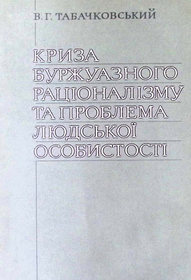The crisis of bourgeois rationalism and the problem of the human personality: Kyiv, Naukova Dumka, 1974, 159 p.
Synopsis
The study presents the analysis of the understanding of social "regulators" of human activity. The author sees French personalism and existentialism as attempts to overcome "classical rationalism" by means of "existentialisation" of reason, where reason is seen as the main "regulator" of human activity. The book demonstrates the problems of the depersonalization of a human in the course of the historical process, the justification of the use of the category of "person", the relationship between pure reason and morality, the understanding of the social nature of reason and cognition, and the problem of rationalist methodology, which is based on the idea that the world can be fully comprehended by reason alone. Clarifying the social conditionality and noting the methodological shortcomings of Western philosophical concepts, the author presents the Soviet interpretation of the Marxist principle of socio-historical practice as the key to solving the problem of social "regulators" of human activity.
Contents
Introduction
The idealistic "existentialisation" of reason
The superpersonality of the reason in classical rationalism and its interpretation in "humanistic" trends
Cogito in subjective idealistic movements
Cogito in objective idealistic movements
The impersonality of "pure reason" and moral imperatives
The Kantian concept of "pure reason" as a self-negation of the Cartesian cogito
Religious "existentialisation" of Kantian epistemology
From "existentialised" to "dialogical" consciousness
The problem of the "other" in cogito
From the "existentialisation" of the mind to the "personalisation" of the world
Reducing nature to an "experienced environment"
Fetishization of the impersonality of social relations
Limitations of personalist "anti-individualism"
Attempts at an idealistic understanding of the modern scientific and technological revolution
From apology to the undervaluation of the history
Religious interpretation of the superpersonal character of the history
Basic principles of dialectical-materialist analysis of the problem of superpersonal "regulators" of human activity
Methodological significance of the principle of social and historical practice for overcoming "gnoseologism"
The difference between various planes of interaction between the "personal", "superpersonal" and "impersonal"
The superpersonality of cognition and the structure of a personality
Antagonistic social relations and the "depersonalization" of the history
Material prerequisites for the formation of the structure of a personality of the subject of the historical process
Conclusion
Downloads




